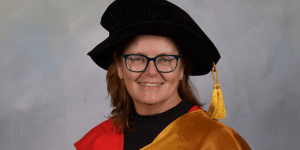1:30min

Optometrist Dr Margaret O’Neill has been recognised for more than two decades of pioneering work in remote and Indigenous eye health, receiving an Honorary Doctorate from The University of Western Australia during its winter graduation ceremonies.
For Dr O’Neill, the honour came as both a surprise and a humbling acknowledgement of her career dedicated to breaking down barriers to equitable eye care.
“I was really honoured and completely surprised even to be considered for this Doctorate,” she said. “I feel a strong imposter syndrome, as I’m only a small part of the entire process. There are so many others worthy of recognition that this really humbles me.”
Falling into remote optometry
Dr O’Neill’s journey into rural and remote practice began by chance when she was living in Northern Australia and noticed the long commute people faced for even the most basic eye care.
Her first defining experience came in Arnhem Land in 1999, where she was confronted with a serious eye condition that highlighted the unique challenges of practising in remote communities.
“It was apparent immediately that ophthalmology and optometry could be most effective when working in unison,” she said. “That lesson has shaped my practice ever since, and I’m proud that Western Australia now has a truly streamlined approach through the Lions Outback Vision program.”
Innovation born from necessity
From creating one of the first patient databases for transient populations to advocating for systemic changes in the Visiting Optometrists Scheme (VOS), Dr O’Neill has consistently looked for innovative, sustainable solutions to entrenched barriers.
What began as a simple database written by a friend 25 years ago is now a state-wide resource, used by optometrists, ophthalmologists and retinal screeners to provide seamless care.
She also spent more than seven years lobbying the Federal Government to reform VOS funding so that it better reflected the realities of remote practice.
Building partnerships and trust
Dr O’Neill is widely recognised for her role in strengthening partnerships between optometry, ophthalmology and Aboriginal health services, creating more coordinated and culturally respectful models of care.
“Success in Indigenous communities is all about consistency, trust and personal relationships,” she said. “Respecting cultural values, listening to families and working alongside communities has made a huge difference.”
These partnerships have transformed outcomes for patients, with Indigenous communities now having access to well-established, collaborative eye care services.
A vision for the future
Reflecting on what’s still needed, Dr O’Neill believes the Lions Outback Vision program is proof of what can be achieved nationally.
“We’ve worked incredibly hard to provide a coordinated approach to eye care. To maintain this, it’s paramount to have solid coordination and recognition of our patients as people, rather than an eyeball.”
Her advice for the next generation of optometrists is simple:
“Step into the unknown and take a chance. So many people care and will catch you when you fall. Work alongside as many as possible across the health system – there’s support and education at every level.”
Looking ahead
While humbled by the recognition, Dr O’Neill remains focused on her work in remote communities.
“This job has been ever evolving and no two days are the same – part of the excitement is not knowing what’s coming next.”
She is quick to acknowledge the many colleagues, support staff and community health workers who have been integral to her journey.
“I’m only a tiny part of a very large wheel. Without people like Professor Angus Turner and the team at Lions Outback Vision, the wheels of eye care in WA would not turn.”